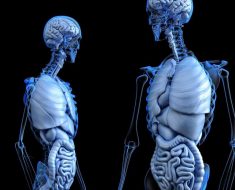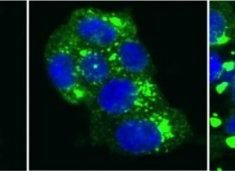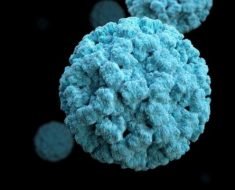Mother-of-four who suffered crippling migraines for five years claims her symptoms vanished after cutting out EGGS from her diet
- Tracy Richardson, 55, was plagued by debilitating headaches since 2014
- Mother, from Oxfordshire, was left bed-ridden for days and struggling to work
- But she claims her headaches vanished in March when she changed her diet
A mother-of-four who suffered from crippling migraines for half a decade claims her symptoms vanished after she stopped eating eggs.
Tracy Richardson, 55, had been plagued by debilitating headaches since 2014 which left her bed-ridden for days and struggling to work.
The sales administrator said her migraines left her sick, lethargic, paranoid and dizzy for ’20 out of 30 days’ of the month.
Mrs Richardson, from Wallingford, Oxfordshire, mistakenly thought the headaches were signs of impending menopause.
But in March, the desperate mother took a food intolerance test – as a last resort – on the advice of a friend.
The results showed she had sensitivities to eggs, milk, yeast and gluten, as well as cashews and sunflower.

Tracy Richardson, 55, suffered from crippling migraines for half a decade, leaving her bed-ridden for days and struggling to work
She claims her headaches suddenly vanished within days of changing her diet.
The exact cause of migraines is unknown, but they’re thought to be the result of abnormal brain activity temporarily affecting nerve signals and blood vessels in the brain.
The chemical tyramine – found in high quantities in cheese and wine – is known to trigger the dilation and constriction of blood vessels, causing sharp pains.
But experts say some migraines are caused by ‘food intolerance’, which is likened to a miniature allergic reaction to certain foods.

The mother-of-four claims her headaches suddenly vanished within days of cutting out eggs from her diet
Mrs Richardson said: ‘Nine weeks ago I was living an utterly miserable life – and now I feel like a completely new woman. I feel like someone’s turned the lights on.
‘The minute I got my results I cut all of the foods out of my diet – and I haven’t had a headache since – I haven’t even taken any painkillers.’
Mrs Richardson said she has her life back and believes the amount of eggs she was eating contributed heavily to her headaches.
She added: ‘I feel like I’ve saved my own life – I know that sounds a bit dramatic, but that’s how it feels to me, I’m in control of my life again.
‘My husband Neil said to me last week, “I feel like I’ve got my wife back”.
‘I think the eggs were causing me the most problems because they’re in everything I was eating.
CAN FOOD TRIGGER MIGRAINES?
The exact cause of migraines is unknown, but they’re thought to be the result of abnormal brain activity temporarily affecting nerve signals, chemicals and blood vessels in the brain.
They can be caused by dietary triggers including:
– Missed, delayed or irregular meals
– Dehydration
– Alcohol
– Caffeine products, such as tea, coffee and energy drinks
– Specific foods, such as chocolate and citrus fruit foods containing the substance tyramine, which include cured meats, yeast extracts, pickled herrings, smoked fish, and cheese
Tyramine dilates and constricts blood vessels in the brain, causing headaches.
But experts say some migraines are caused by ‘food intolerance’, which is likened to a less severe allergic reaction.
When food particles enter the bloodstream, if the immune system identifies them as foreign, antibodies are produced to attack them.
This can create inflammation and cause headaches.
A variety of foods can cause a food intolerance, but the most common offenders include:
– Dairy
– Corn
– Wheat
– Cane Sugar
– Yeast
– Cow’s Milk
– Eggs
– Citrus
– Grain Cereals
Diagnosing a food allergy headache is extremely difficult.
While there is testing for food allergies, they are not very accurate, giving a false positive result about 40 to 60 percent of the time.
Source: NHS and National Headache Institute
‘Another of my worst offenders was vinegar because it has yeast in it and I eat lots of salad with dressings on.’
Mrs Richardson endured half a decade of headaches that left her bedridden for days on end.
The migraines were forcing her to slash her work hours to go home and rest.
She said by the time she got home she was often too lethargic to walk the dogs and would end up passing out.
‘Twenty out of 30 days I’d have a headache or a migraine,’ she added.
‘And when I say headaches, I mean ones that would wake me up at 3am and I wouldn’t be able to go back to sleep.
‘It was completely debilitating. I was always having time off work because the pain meant I couldn’t get out of bed – no amount of painkillers would work.’
She has shared her experience with the 10,000 people who follow her blog: Words from a Bird.
The mother has told her readers she is now able to walk 30 miles a week – something that was impossible just months ago.
According to charity The Migraine Trust, migraines are the most common and disabling neurological disorder in the UK, affecting one in seven people.
Symptoms can also include disturbed vision, sensitivity to light, sound and smells, feeling sick and vomiting.
When food particles enter the bloodstream, if the immune system identifies them as foreign, IgG antibodies are produced to attack the problem food.
Through a finger-prick blood test YorkTest Laboratories is able to analyse a person’s IgG reactions to up to 208 food and drink ingredients.
But testing for food allergies gives a false positive result about 40 to 60 percent of the time, according to the National Headache Institute.
YorkTest advises people to cut their food intolerances out for 12 weeks, with the possibility of starting to slowly reintroduce them afterwards – but Mrs Richardson says she won’t be going back.
Dr Gill Hart, a biochemist and scientific director at YorkTest Laboratories, said: ‘When a person has a food intolerance, their immune system’s natural defence mechanism is to ward off the harmful invaders in the body, and this can create inflammation.
‘Bloating, IBS, acne, migraines, eczema, rhinitis, lethargy and general tiredness – can all be the consequences of eating foods a person is intolerant to.
‘Symptoms manifest in many ways – and with Mrs Richardson having a number of intolerances and cutting them all out – I’m not surprised she’s experienced such life-changing results.’
Source: Read Full Article





